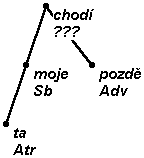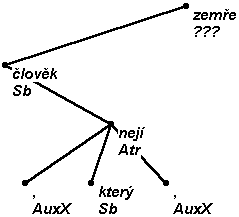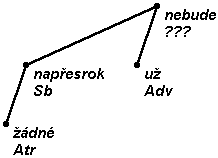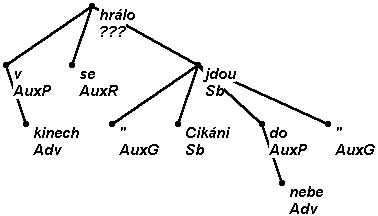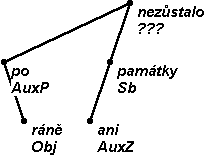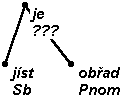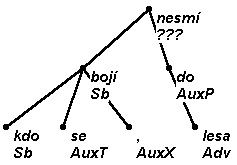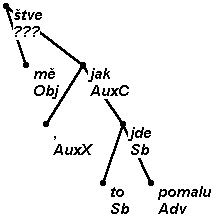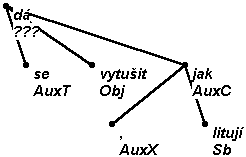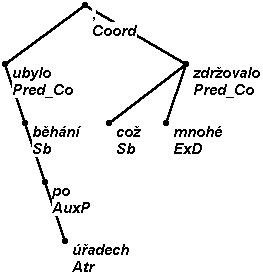First, in the part Definition of subject we shall explain what is subject (Sb) and define it.
The main contents of this section consist of the part Expression of a subject, subdivided according to individual types of expression of a subject. Sb can be expressed by a noun in nominative (Subject expressed by a noun in nominative), an adjective (Subject expressed by an adjective), a pronoun (Subject expressed by a pronoun), a relative pronoun (Subject expressed by a relative pronoun), an inflexible word (Subject expressed by an inflexible word), a quotation (Subject expressed by a quotation), a genitive of negation (Subject expressed by genitive of negation), a partitive genitive (Subject expressed by partitive genitive), a genitive possessive by origin (Subject expressed by a genitive possessive by origin), a prepositional case (Subject expressed by a prepositional case), a numeral (Subject expressed by a numeral), an infinitive (Subject expressed by infinitive), a subordinate clause introduced by a relative pronoun (Subject expressed by a subordinate clause introduced by a relative pronoun), a subordinate clause introduced by a conjunction (Subject expressed by a subordinate clause introduced by a conjunction), a dative (Subject expressed by dative), a pronoun což (what) in a pseudo-relative clause (Subject expressed by the pronoun což (what, which) in a pseudo-relative clause), or it can be introduced by the conjunction než (than) (Subject introduced by the conjunction než (than, but)).
In conclusion, in the part Possible confusion of subject and object, some attention is devoted to mutual substitution of functions Sb and Obj in problematic constructions.
Subject of a clause can be represented by practically any construction to which the question who (what) can be applied. A subject always depends on the predicate, which means that it technically depends on the node which bears afun Pred in the main sentence and the function of subordinate clause in such a construction (see the part Delimitation of the predicate). If an apparent subject 'stands out' of the sentence (e.g., Voda, to je základ mlékaření - Water, that's the basis of dairying), its expression is regarded as a parenthesis (see A syntactially non-incorporated sentence part or sentential form; ellipsis; an independent sentence part; vocative; interjection Exd_Pa).
Subject is as a rule expressed by a noun or a pronoun in nominative, but it can also be expressed by any other part of speech.
The expression of Sb is emphasized:
The expression concerned is emphasized:
The expression of Sb is emphasized (also in the examples below):
Mind! A partitive genitive can figure as Sb unless there is a quantitative modification governing it: then the governing node of this modification is the Sb, while the genitive forms are its Atr (cf. ze stromů napadalo hodně jablek - plenty of apples have dropped from the trees). This problem is treated in more detail in Genitive in the function of Sb, Obj and in the function of their Atr.
Prepositional cases with partitive, approximative meanings are concerned.
For more detailed information see Expression with numerals, figures in different functions, and also Phrases of comparison with conjunctions jako (as), než (than).
Note
The word lze is a syntactic verb and it forms a simple verbal predicate (the part Simple verbal predicate), consequently it does not represent a modal verb (part Compound verbal predicate) and the infinitive here can fulfil the function of a subject.
A subject clause can be introduced by conjunctions že, aby, -li, zda, jak, když (that, so that, if, whether, how ...).
Conjunction of sentences of which the second is introduced by relative pronoun což is regarded as a coordination where the což in the second sentence is considered as the sentence member for which it stands (see part Coordination in sentences with což (which), přičemž (whilst)).
In assigning analytical functions Sb and Obj a confusion often is present, especially in:
In case of doubt a simple test can be used - to introduce a feminine noun of the paradigm žena, where the forms of nominative and accusative are different. E.g., in the sentence Hitlerovi se nepodařilo tisíciletou říši ustavit (Hitler failed to establish the thousand-years empire) the word ustavit (establish) functions as subject - it can be said žena-Nom se podařila, not ženu-Acc se podařila. Similarly also in other examples:
-
nalezly se finance -- nalezla se žena-Nom (funds have been found -- a woman has been found)
-
uvádí se, že Tibet je okupován -- uvádí se pravda-Nom (it is claimed that Tibet has been occupied -- truth is claimed)
-
navrhuje se, aby přídavky činily... -- navrhuje se kravina-Nom (it is suggested that the bonuses make up... — a nonsense is suggested)
-
konstatuje se, že je vše v pořádku -- konstatuje se nepravda-Nom (it is stated that everything is OK -- untruth is stated)



